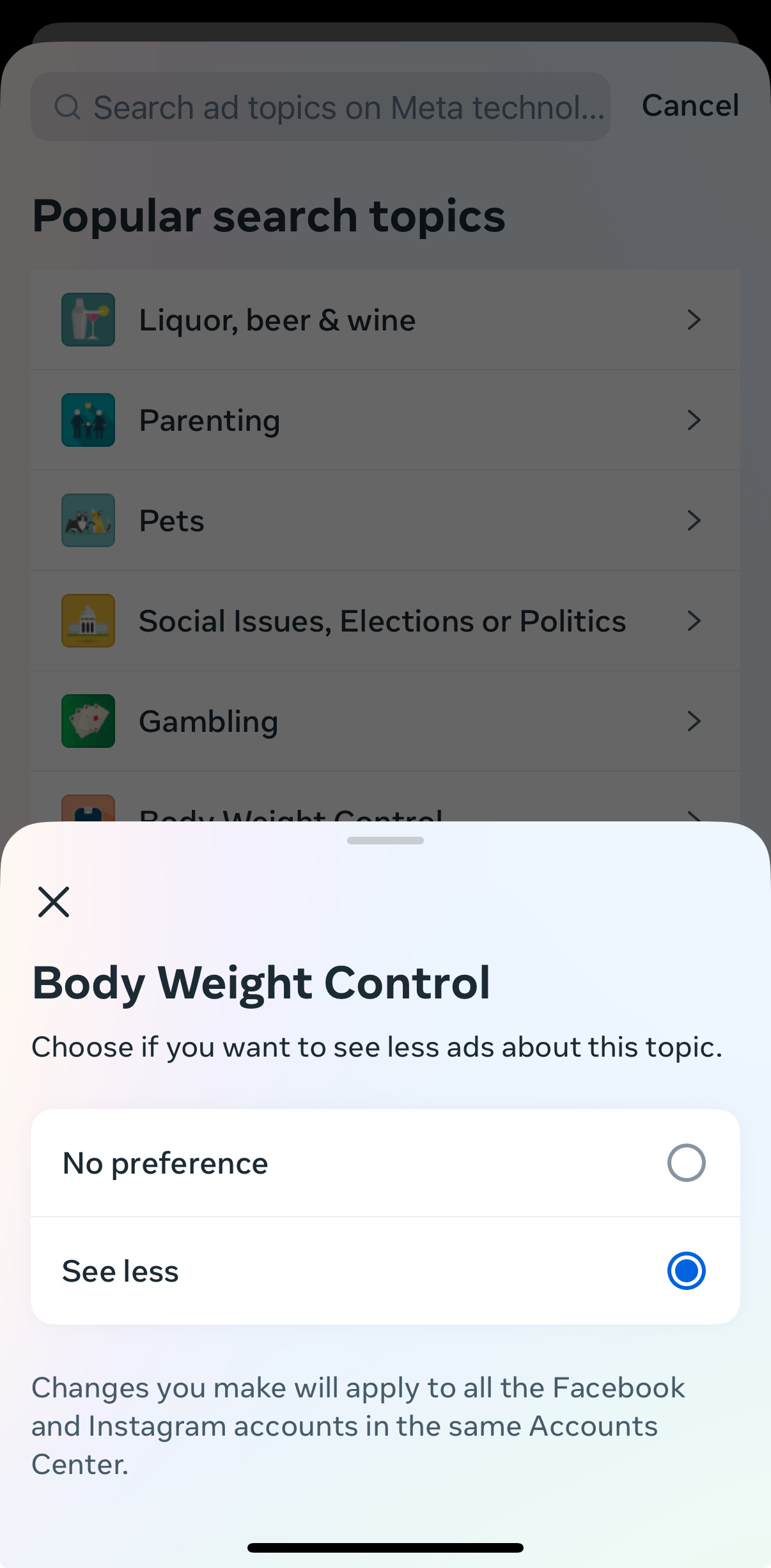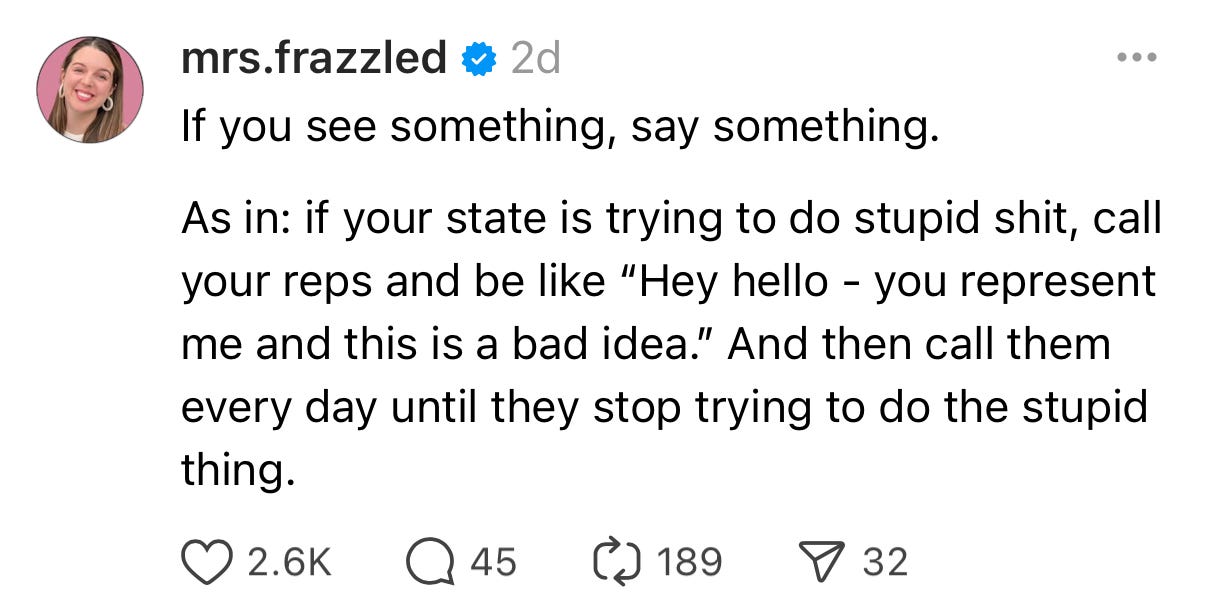Resolutions for a Healthy Media Diet in 2025
Science-based recommendations for media consumers and content creators alike
Happy new year, Healthy Media readers! Who the fudge knows what 2025 will bring, but here are some of my hopes for those of us who consume health-related media as well as those of us who make it.

Health Media Consumers
You are just living your life, trying to pay the bills and stay informed about the latest and most accurate and helpful health information you can find. Here are some actions you can take in 2025 to help insure you are seeing the health information you need as well as fostering change (in mediated and face-to-face life) to make your communities healthier, too.
Use Media to Shift Social Norms
Do not be shy about posting on social media, writing a good ol’ fashioned letter to the editor, or even just emailing or texting others about health topics you care about. It does not always have to be a full opinion piece, it can just be factual updates about things you are doing: Got my flu shot this year, donated blood, switched out a few alcoholic beverages a week for a mocktail, etc.
Research time and time again shows that people are more influenced by social norms, or what they perceive to be “normal” behavior in society than the are by their own attitudes. That is, people will recycle even if they do not really like doing it just because they see their neighbors doing it, too. So, if you use media to share more about your own healthy behaviors, the results can be contagious across your social networks.
Curate Your Own Health Media Diet
Health News. There will be many, many news stories related to health and healthcare in 2025. At times, they will could feel overwhelming (confirmation hearings for public health positions, bird flu, changes in vaccination requirements and availability, changes in coverage for pre-existing conditions, you name it). However, do not forget that you have the agency to dictate what type of health news you follow and how you follow it. So, while things are momentarily calmer, take a few moments now to prune who you follow for health news and then focus in on those trustworthy, interesting outlets and thought leaders.
For healthcare policy news, I highly recommend the KFF Health News website (and the social media accounts of their reports, like Phil Galewitz) and the Public Health On Call podcast produced by Johns Hopkins Bloomberg School of Public Health.
For personal health and medical information, there are so many different sources of media coverage it is hard to highlight just a few. However, most national mainstream news organizations have thoughtful, well-researched health news you can follow for trustworthy information. NPR has it’s “Shots” page, USA Today’s health section is not behind a paywall, and CNN has a long history of investing in health reporting.
There are many others I’m leaving out, including good local reporters, too. Comment below with your own favorite health news outlets and reporters and we can all find good health information sources to follow in 2025!
Health Ads. While news is a hugely important source of health information, in 2025, I will be watching strategic health media like a hawk. Our mediated lives are constantly speckled with advertisements, sponsored posts, and product placements that are trying to nudge us toward buying the latest supplement or cold plunge tub or asking your doctor if Akynzeo may be right for you.
Most of it is unscientific garbage. I will go into detail on that in the Content Creator’s Resolutions below. However, being aware of the onslaught of health-related ads we see is one way to protect yourself from spending unnecessary money or making decisions that, in the end, may not make you any healthier.
In addition to being aware of how often people are trying to sell us something to make us healthy that is not supported by rigorous science, some social media platforms actually allow you to limit those ads. On Instagram, you can adjust the ads you see across Meta platforms (Instagram, Facebook, etc.) by going to your Settings tab on our Instagram profile page. Then, scroll down to the feature labelled “ads” and click on “ad topics.” You will see a search bar at the top. There you can type in a number of problematic topics, like “body weight control” or “affordable supplements,” it will let you click “see list” and then you can select “show less ads about this topic.”
You can also go to your Instagram settings and select “Content preferences” then “Reduced by fact-checking” and make sure you’ve selected “Reduce more” to ensure that more of what the algorithm feeds you is verifiably accurate
Call Congress
In addition to curating your health media news sources and trying to tamp down on health ads, Mrs. Frazzled summarizes my next resolution pretty well:
Doing something, even a small action, is important for our mental health as we work to support our individual health and public health, too. We can use our smart phones for just a few minutes a few times a week to do just that.
If you know who your U.S. House rep is, just call (202) 224-3121 and the switchboard can connect you. If you aren’t sure who your rep is, that’s okay, too! Look it up here and then call them. You can find contact information for U.S. Senators here.
Only takes a few minutes and you almost always just leave a message. If a real person answers, it’s usually a young staffer who will politely take notes about whatever you want to tell them. I am a card carrying millennial who hates phones but this type of call is not that bad and I always feel better afterward. Calling is better than emailing, but if you really, really hate calling, then email away.
But, don’t stop at federal policy makers! State and local lawmakers can also have a huge impact on our health and you can resolve to let them know what you think about their proposals and votes. For instance, state lawmakers in South Carolina just reintroduced a bill that would charge women with homicide, potentially punishable by the death penalty, for abortion.
You can call when good things happen, too. For a positive example of state lawmakers making a difference: In 2023, Oregon started a mental health hotline for agricultural and forestry industry workers. A Republican state senator sponsored the bill and the Democratic governor signed it into law. It would only take a few minutes to make sure lawmakers knew people appreciated such bipartisan efforts to improve mental health.
Heath Media Creators
This is my wish-list for those who create health information, be it traditional news outlets, podcasts, or social media influencers.
Write Good Headlines
Reporters do not always control their own headlines. Regardless, many media consumers do not read beyond the headline, so these are crucial tidbits of information. Turning misinformation into a clickbait headline (“Can ivermectin cure COVID-19?” or “Does coffee cause cancer?”) lends credence to that misinformation instead of nipping it in the bud. Work hard to think of other, more creative ways to get people to click without (unintentionally, I hope) getting people to think “oh, dang, maybe it can work this way.”
Include Solutions When Discussing Problems
People have an innate negative bias that draws us to information about threats. However, the constant drip-drip-drip of scary health information can cause a number of unhelpful audience responses, from desensitization to tuning out to denigrating the message source. So, take a page from the Solutions Journalism Network and find ways to also discuss the ways in which people and policies can improve health, too.
Quote People Directly Affected By Health Issues
Stories are often an effective way to get the public’s attention, beyond the occasional surprising statistic. Hearing direct quotes from people directly affected by health issues and health policy choices can foster compassion over pity and motivate audiences to pay attention, too. Yes, of course, also interview the experts (doctors, legislators, hospital CEOs), but the people on the ground are also compelling and likely more relatable to your audiences, too.
Stop Allowing Quack Products to Run Ads on Your Platforms
AG1, Zbiotics, Nutrafol—none are scientifically proven to work and some even have potentially dangerous side effects. Yet, if you listen to podcasts, chances are you have heard ads for at least one if not all of these.
The green drink AG1 (formerly known as Athletic Greens) has such small doses of the vitamins or minerals that could, theoretically, help you that you will not get enough of it from their (expensive) product alone. Moreover, you risk any number of potentially negative side effects from taking these unproven supplements. Yet, so many podcasts I listen to are hawking AG1 as if one drink means you never need to eat a vegetable again.
You can read more here for a good overview of why Nutrafol will not help your hair and has been linked to some reports of liver damage. And, Zbiotics claims that it cures hangovers, but do a little digging and you will see that the “science” it bases these claims on actually was only done on rats and is not only unproven but likely to be “useless” based on research on other similar products.
Just stick to ads for socks or furniture and avoid the unproven supplements, please. Especially for media outlets that want to criticize RFK Jr.’s views but then run ads for products like these, just know that you are only undermining your credibility.
That’s all for today.
Find some good health information sources, share Healthy Media posts with your friends, fuel yourself, move your body, let your mind rest, and may peace find your spirit in 2025.






